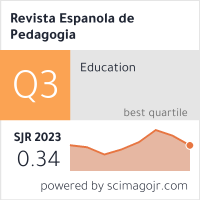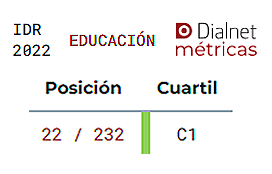Vitalist and Synthetic Thought in the General Pedagogy in Spain
Abstract
This paper presents an interpretation of twentieth-century pedagogical thought in Spain attending vitalist and synthetic perspectives.We propose an explanation of the changes in the theoretical knowledge of education that have led to the current situation. The research was conducted by studying some of the greatest exponents of General Pedagogy in Spain: Ramon Ruiz Amado, Rufino Blanco, Juan Zaragüeta, Juan Roura-Parella, Víctor García Hoz, Juan Tusquets and Alejandro Sanvisens. We expose and discuss their ideas, suggestions and influences and their place in the history of Spanish pedagogy is presented outlining two major trends: vitalist and synthetic. Results exposed as a set of convergences between the two schools of thought that we have studied, constituting a line of historical continuity. At the same time, this study shows how the tradition in this disciplinary ambit has been interrupted, and identifies significant divergences between general Pedagogy and some postmodern drifts in Educational Theory.
Citación recomendada | Recommended citation
Torrano y Xavier Laudo Castillo, C. V.
(2013)
.
Vitalist and Synthetic Thought in the General Pedagogy in Spain.
Revista Española de Pedagogía, 71(255).
https://www.revistadepedagogia.org/rep/vol71/iss255/20
Licencia Creative Commons | Creative Commons License
Esta obra está bajo una licencia internacional Creative Commons Atribución-NoComercial 4.0.
This work is licensed under a Creative Commons Attribution-NonCommercial 4.0 International License







